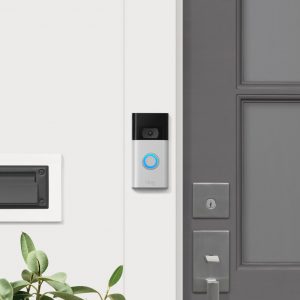Private Surveillance versus Public Monitoring
By Anonymous | September 18, 2020
In an era where digital privacy is regarded highly, we put ourselves in a contradictory position when we embed digital devices into every aspect of our lives.
One such device that has a large fan club is the Ring doorbell, a product sold by Ring, an Amazon company. It serves the purpose of a traditional doorbell, but combined with its associated phone application, it can record audio and video to monitor motion detected between five and thirty feet of the fixture. Neighbors can then share their footage with each other for alerting and safety purposes.

Ring Video Doorbell from shop.ring.com
However, as most users of smart devices can anticipate, the data our devices generate rarely remains solely ours. Our data has the ability to enter the free market for alternate uses, analysis, and even for sale. One of the main concerns that has surfaced for these nifty devices is the behind-the-scenes access to the device’s data. Ring has been in partnership with law enforcement agencies across the United States. While intentions of this partnership are broadcasted as a way to increase efficiency in solving crime, it begs a larger question. Washington Post’s Drew Harwell points out that “Ring users consent to the company giving recorded video to “law enforcement authorities, government officials and/or third parties” if the company thinks it’s necessary to comply with “legal process or reasonable government request,” according to its terms of service. The company says it can also store footage deleted by the user to comply with legal obligations.” This begs a larger ethical question on whether these kinds of policies infringe on an individual consumer’s autonomy per the Belmont Principle regarding Respect for Persons. If we can’t control what our devices record, store, and what that data is used for, who should have that power?
What began as a product to protect personal property has garnered the power to become a tool for nationwide monitoring voluntarily or involuntarily. This product which is intended for private property surveillance can become a tool available for public surveillance given the authority law enforcement has for access to device data. While the discussion of the power given to law enforcement agencies is larger in scope, in context of the Ring device, it leaves us wondering if one product has garnered a beastly capability to become a tool for mass surveillance. This then creates a direct link to the Fair Information Practice Principles. Per the Collection Limitation principle, the collection of personal information should be limited and obtained by consent. The Ring devices blur the definition of personal information in this instance. Is the recording of when you leave and enter your home your personal information? If your neighbor captures your movements via their device, does their consent to police requests for access to their device compromise your personal autonomy because your activity is the one being shared?
In contrast to this, an ethical dilemma also arises. If neighbors sharing their device data with law enforcement can catch a dangerous individual (as the Ring terms and conditions state), is there a moral obligation to share that data despite having consent of the recorded individual? This is the blurry line between informed consent and public protection.
Lastly, as law enforcement becomes more easily able to rely on devices like Ring, it brings about a larger question of protection equity. With a base cost of approximately $200 and a monthly subscription of approximately $15 to maintain the device’s monitoring, there is a possibility for protection disparity. Will the areas where people can afford these devices inherently receive better protection from local law enforcement because it is faster and easier to solve those crimes? Per the Belmont Principle regarding Social Justice, the burden of civilian protection should be evenly distributed across all local law enforcement agencies. Would it be equitable if police relied on devices like this as a precursor to offering aid in resolving crimes? On the contrary, these devices also have the ability to hinder law enforcement by giving early warning of police searches to a potential suspect. Is that a fair advantage?

Police officer facing Ring doorbell
These foggy implications are what leave once crime cautious citizens wondering if these devices are tethering the lines of data privacy and ethics concerns and even contributing to a larger digital dystopia.
